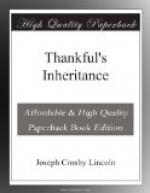“I’ll explain. I am trying to explain. The peculiar point comes in just here. You, Mr. Kendrick, never owned that land.”
E. Holliday bounced in his chair.
“Didn’t own it!” he roared. “What nonsense are you talking? The land belonged to my father, Samuel Kendrick, and I inherited it from him.”
“No, you didn’t.”
“I tell you I did. He left everything he had to me.”
“Yes, so he did. But he didn’t own that land. He owned it at one time, probably he owned it when he made his will, but he didn’t own it at the time of his death. Your father, Mr. Kendrick, was in financial straits at various times during his residence here in Orham and he borrowed a good deal of money. The most of these were loans, pure and simple, but one at least wasn’t. At one time—needing money badly, I presume—he sold this strip of land. The purchaser thought it was worth nothing, no doubt, and never mentioned owning it—at least, until just before he died. He simply had the deed recorded and forgot it. Everyone else forgot it, too. But the heirs, or the heir, of that purchaser, I discovered, was the legal owner of that land.”
Captain Obed uttered an exclamation.
“Why, John Kendrick!” he shouted. “Do you mean—”
“Hush, Captain! Mr. Kendrick,” addressing the red-faced and furious gentleman at his left, “have I made myself clear so far? Do you follow me?”
“Follow you? I don’t believe it! I—I—don’t believe it! Who was he? Who did my father sell that land to?”
“He sold it to his brother, Bailey Kendrick, and Bailey Kendrick was my father. Under my father’s will what little property he had came to me. If anything is sure in this world, it is that that land occupied by Mrs. Barnes belonged, legally, to me.”
Neither of his hearers spoke immediately. Then E. Holliday sprang to his feet.
“It belongs to you, does it!” he shouted. “It belongs to you? All right, so much the better. I can buy of you as well as anybody else. That’s why you sent me back your retainer, was it? So you and I could trade man to man. All right! I don’t believe it yet, but I’ll listen to you. What’s your proposition?”
John shook his head.
“No,” he said. “You’re wrong there. I sent you the retainer because I wished to be absolutely free to do as I pleased with what was mine. I couldn’t remain in your employ and act contrary to your interests—or, according to my way of thinking, I couldn’t. As I saw it I did not own that land—morally, at least. So, having resigned my employment with you I—well, I gave the land to the person who, by all that is right and—and honest, should own it. I had the deed made out in her name and I sent it to her an hour ago.”
Captain Obed had guessed it. Now he sprang from his chair.
“John Kendrick,” he shouted, in huge delight, “you gave that land to Thankful Barnes. The deed was in that big envelope Winnie S. Holt was takin’ to her this very mornin’!”




